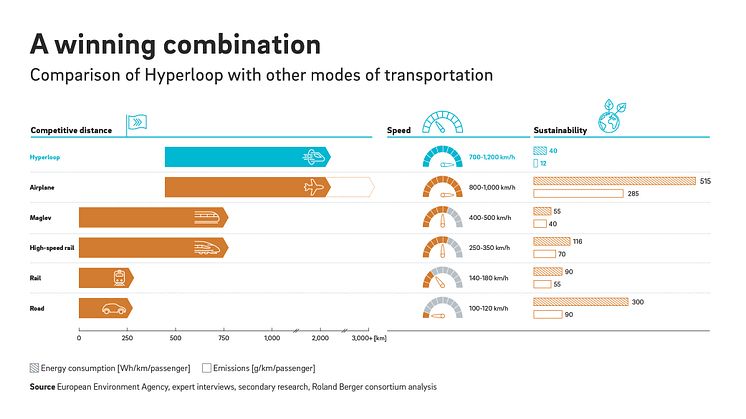
Press release -
Revolution in sustainable travel: Hyperloop is 25 times cleaner than commercial airplanes
- Hyperloop is expected to reduce domestic air traffic by 40% on selected long-distance domestic routes
- Operating speeds to optimize energy efficiency will be around 800 km/h
- Linked networks provide seamless travel and on-demand services
Munich, June 2023: Hyperloop could be one of the means for traveling in the future – it is more environmentally friendly, more comfortable, and faster than other current forms of transport. But more than 200 years after it was first conceived, the technology is yet to be taken up by a major backer, delaying Hyperloop's development and implementation. In its new study, “Hyperloop: Mobility revolution or pipe dream?”, Roland Berger analyzes the reasons behind this delay and what can be done to overcome them.
“Hyperloop is a disruptive technology that offers sustainable high-speed transport through its mixture of magnetic levitation in a low-pressure environment,” says Tobias Schönberg, Partner at Roland Berger. “It can offer passengers the comfort of a train with the speed of an airplane.”
In Hyperloop systems, electric propulsion and magnetic levitation propel pods capable of carrying 25 to 60 people through low-pressure tubes. The tubes are near vacuum to minimize drag, while the magnetic levitation technology allows the pods to avoid friction and travel efficiently at high speeds.
This new form of travel offers a superior value proposition to other modes of long-distance travel. It is more environmentally friendly than aircraft, and faster than conventional rail or road transportation. According to Roland Berger’s study, Hyperloop’s emissions are five times lower than its closest land-based counterpart, high-speed rail, and nearly 25 times cleaner than commercial aircraft.
Clean, quick, and convenient
The operating speeds of Hyperloop, aimed at optimal energy efficiency, will be around 800 km/h. This could revolutionize travel between major economic centers like Dubai and Riyadh. For this journey, typically made by air, passengers currently have to allow for a travel time of around four hours, including commutes, waiting and the flight itself. With Hyperloop, the journey time could be cut by at least half.
According to the study, Hyperloop solutions could reduce domestic air traffic by 40% on selected long-haul corridors. Moreover, Hyperloop offers the opportunity to provide on-demand services that do not run on a fixed schedule. Pods could bypass selected stations and provide a seamless journey without unnecessary stops.
“Passengers want convenience – and Hyperloop technology can deliver it. By offering a blank canvas in terms of its network, Hyperloop can differentiate itself from other modes of transport. It can avoid the mobility flaws that have evolved in some cities through expanding infrastructure such as missing links between regional railroad stations and airports,” says Schönberg.
How to gain new momentum in the industry
To advance the development of Hyperloop, governments and other stakeholders would need to collaborate more closely, based on a clear legal framework. Public funding could cover some initial costs, reducing the investment risks in the technology’s early stages; and large areas of public land could be used to host test facilities. Ideally, these would be located near the route of potential Hyperloop corridors to save on future investments.
Topics
Categories
Roland Berger is the only management consultancy of European heritage with a strong international footprint. As an independent firm, solely owned by our Partners, we operate 51 offices in all major markets. Our 3000 employees offer a unique combination of an analytical approach and an empathic attitude. Driven by our values of entrepreneurship, excellence and empathy, we at Roland Berger are convinced that the world needs a new sustainable paradigm that takes the entire value cycle into account. Working in cross-competence teams across all relevant industries and business functions, we provide the best expertise to meet the profound challenges of today and tomorrow.




